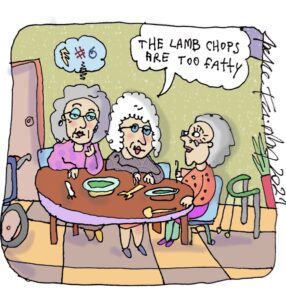 Covid has taught that attempting to manipulate outcomes is futile.
Covid has taught that attempting to manipulate outcomes is futile.
A recent conversation with my 92-year-old mother caused me to consider the weight of judgment. Her upscale senior residence boasts a lovely wood paneled, carpeted dining room. She’d recently been invited to join a table of dining regulars, consisting of six women. Mom felt flattered. Inclusion feels so welcoming and, as in high school, there is popularity in numbers. She had previously bemoaned not having a regular dining partner and wasn’t content. Finally, she’d been chosen. Her new table mates were accomplished, well-read and, as Mom initially stated, “a cut above”. Elitist or not, Mommy had been selected by the In Crowd.
A few days after joining the table, our nightly phone conversation felt unnaturally subdued. Was something wrong? Some health issue she wasn’t ready to share or, perhaps, was she just fatigued after an Intro to Wheelchair KickBoxing class?
I probed. ‘What is it, Mom? What’s bothering you?’
“I’m ashamed to say it. But these women complain constantly. The lamb chops are too fatty. The pie crust is impossible to cut. Everything is either too cold or too hot. They make nasty comments about everything and everyone and the food is getting stuck in my throat. I keep my mouth shut but I’m so unhappy. And if I change tables, I’ll become the next object of their ridicule. I made a mistake. Mealtime is a torture.”
How could I help from 6,000 miles away in Jerusalem? I offered benign remarks but ached to scold those ladies, give a heavy-duty lecture about lashon hora (Evil Speech), and protect my ‘child,’ my mother. But I couldn’t.
The acidic meal-times were otherwise uneventful until one evening, a woman at mom’s table noticed another two residents at a table for two that had fallen asleep at supper. The dozing-duo rested their respective heads against the wall and were snoring. On cue, mom’s table mates alerted the entire dining hall with finger-pointing and unbridled laughter. Their cheeks were wet with tears and one elbowed Mom to yuk-yuk along with them. But she’d had enough. Despite landing at a table of geezer Mean Girls, this wasn’t her. If this is what a “cut above” looked like, Mom would continue to debase herself by exhibiting grace, respecting others and being kind.
Muttering that she didn’t see what was so funny and that she’d eaten enough, she slowly lifted herself from the chair and, decisively grasping the handles of her walker, left the dining room. And her table mates. And the cruelty. If this was ‘inclusion,’ she wanted out.
Which brings me to the New Year. Resolutions are only useful if others benefit as well because we exist as part of a tapestry called Mankind. What if, this January, we added something to the standard list of resolutions (giving more charity, getting in shape, being more devoted to a spouse) to include sitting with our discomforts and/or disappointments, refraining from complaining and waiting for gratitude to fill the vacuums? Too hard? What if we attempt to try it for an hour a day? I’d venture to guess that the cosmic repercussions of said endeavor would be earth trembling.
When I spoke with Mom last night, she reported that the lamb chops were tender, the pie crust delicious and that her new table mates were dull and lovely. She wished me a Happy New Year. I answered, ‘You, too. I’m proud to be your daughter.’
New York native Andrea Simantov has lived in Jerusalem since 1995. She writes for several publications, appears regularly on Israel National Radio and owns an image consulting firm for women.









